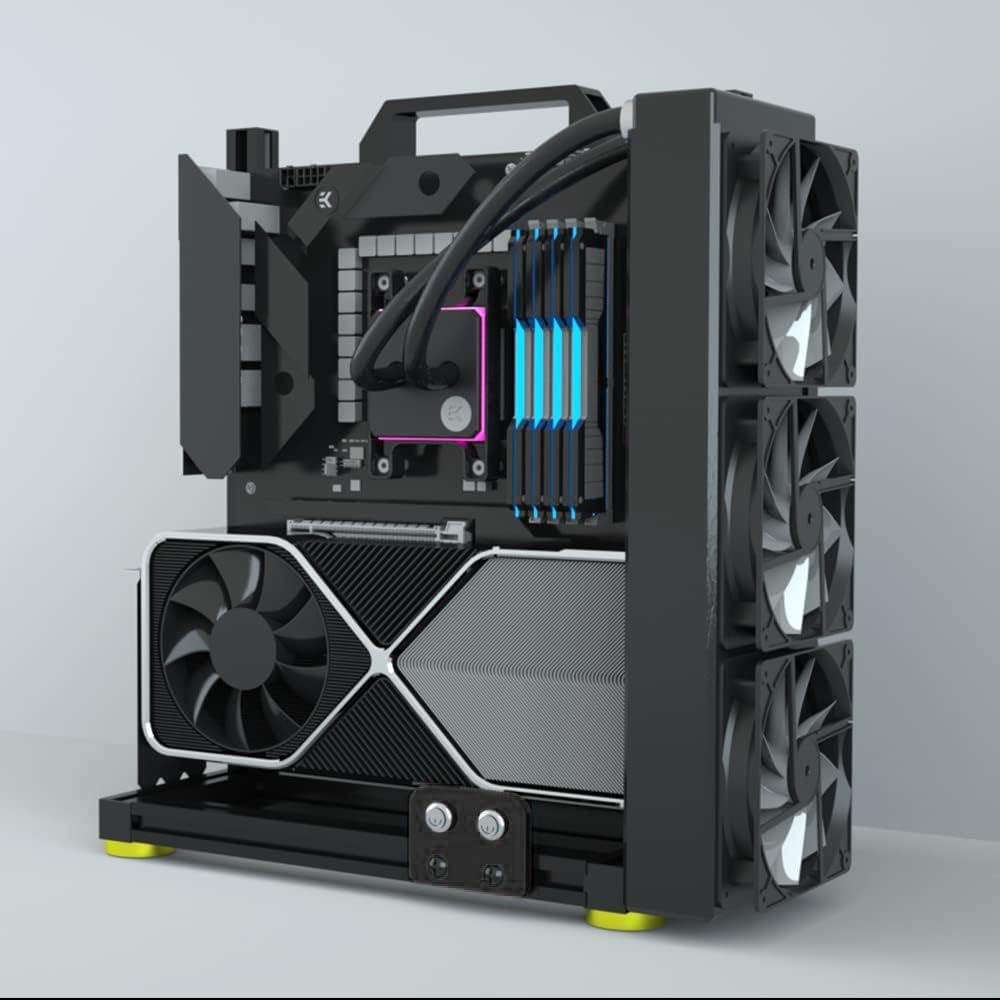Not everyone wants a full tower PC taking over their desk and with today’s compact cases, you don’t have to trade size for power. Micro form factor (MFF) cases strike a sweet balance: small enough to fit in tighter spaces, yet roomy enough for full-sized GPUs, serious cooling, and even custom loops if you plan it right.
This list highlights the best MFF cases in 2025 across different budgets and build styles – whether you’re into clean airflow, wood-and-aluminum aesthetics, or just want something compact that can still house a beast of a rig. Let’s break down what makes each one worth your time.
Best MFF Case: Quick Comparison
| Case Model | Motherboard Support | Cooling Support | Price (Amazon) |
| Jonsplus i100 Pro | Mini-ITX | 360mm AIO | $200 – Buy Now |
| Fractal Design Terra | Mini-ITX | 120mm AIO | $180 – Buy Now |
| Lian Li A3-WD | mATX / ITX | 360mm AIO | $90 – Buy Now |
| Cooler Master NR200 | Mini-ITX | 280mm AIO | $433 – Buy Now |
| Thermaltake Versa H18 | Micro-ATX | 280mm AIO | $55 – Buy Now |
| Corsair 3000D Airflow | ATX/mATX/ITX | Up to 8x 120mm fans | $95 – Buy Now |
| G.SKILL LT1 | Micro-ATX | 280mm AIO | $70 – Buy Now |
Best MFF Case: Top Picks
Jonsplus i100 Pro
Quick Highlights
- Compact transparent Mini-ITX chassis
- Supports 360mm AIO, 3-slot GPUs
- Magnesium-aluminum shell, tempered glass panels
- Excellent thermals for its size
- Price – $200 – Buy Now
The i100 Pro from Jonsplus is all about high-end compact performance. Despite its compact size, it supports a full-length triple-slot GPU, a 360mm radiator, and even 166mm air coolers – a rare feat in this class. The magnesium-aluminum frame gives it a premium feel, and the tempered glass on both sides highlights internals like a showcase.
This case is ideal for users building compact, powerful systems without compromise. Despite the small footprint, airflow is solid thanks to strategic venting and support for multiple intake/exhaust setups. It’s not cheap, but it delivers premium build quality and hardware clearance that rivals much larger cases.
Pros
- Outstanding build quality
- High-end cooling and GPU support
- Elegant, compact layout
Cons
- Premium price tag
- Mini-ITX only
Fractal Design Terra
Quick Highlights
- Includes PCIe 4.0 riser
- Front I/O with USB-C
- Crafted from anodized aluminum and real wood
- Price – $180 – Buy Now
Fractal’s Terra is one of the best-looking SFF cases you can buy. Built from anodized aluminum and a genuine walnut front panel, it delivers more than just aesthetics. It fits a 2.5-slot GPU up to 322mm and includes a PCIe 4.0 riser for vertical mounting. It’s tight inside, but well thought out—adjustable compartments let you prioritize GPU or CPU space.
It’s best suited for lower-wattage CPUs and small AIOs or compact air coolers due to its limited height clearance. If you’re going for a clean desk build or a living room PC, the Terra nails both form and function, especially for GPU-first builds.
Pros
- Gorgeous materials and finish
- Smart internal adjustability
- Solid riser cable included
Cons
- Very limited CPU cooler clearance
- Tight cable routing
Lian Li A3-WD
Quick Highlights
- Modular mATX chassis
- Supports up to 360mm AIO, 415mm GPUs
- Wood front panel, DAN Cases collaboration
- Zero included fans
- Price – $90 – Buy Now
The A3-WD is a hybrid between compact tower and airflow-focused micro form factor. It supports micro-ATX and Mini-ITX boards with ease, while allowing full-length GPU clearance and a 360mm radiator. The modular design lets you reconfigure internal space depending on your cooling and storage priorities.
A wood-textured front panel adds character, and the open internal layout ensures compatibility with large GPUs like the RTX 4080 or Radeon 7900 XTX. This is a builder’s case – no fans included, but tons of flexibility for high-performance setups that still keep a modest footprint.
Pros
- Massive hardware support in under 27L
- Clean, modular interior
- Looks unique with wood styling
Cons
- No fans included
- Requires thoughtful cable management
Cooler Master NR200
Quick Highlights
- Mini-ITX airflow classic
- 330mm triple-slot GPU support
- Up to 280mm AIO, SFX PSU
- Tool-free panels and modular bracket design
- Price – $433 – Buy Now
The NR200 has become a benchmark in the MFF space for good reason. It fits large GPUs, decent AIOs, and maintains excellent airflow with its perforated panels. It’s easy to build in despite its small size – tool-free side panels, removable brackets, and cable routing space are all well-executed.
It works well for everything from mid-range gaming rigs to compact workstation builds. While it doesn’t have luxury materials or wooden accents, it nails the fundamentals – and that’s why it’s still one of the most recommended SFF cases even today.
Pros
- Great cooling and internal layout
- Easy to build in
- Budget-friendly for what it offers
Cons
- SFX PSU only
- No built-in dust filters
Thermaltake Versa H18
Quick Highlights
- Budget mATX chassis with tempered glass
- Up to 350mm GPU, 280mm AIO support
- Mesh front panel for airflow
- Clean, simple look
- Price – $55 – Buy Now
If you’re looking for a budget-friendly micro-ATX case, the Versa H18 is about as affordable as it gets without cutting critical corners. It features a tempered glass side panel, a mesh front intake, and support for up to 280mm AIOs. You also get decent room for GPUs and cable routing.
While it doesn’t offer premium finishes or modularity, it’s a very usable chassis for entry-level and mid-range builds. If you want to keep costs down and still run a decently powerful system, it checks all the right boxes.
Pros
- Very affordable
- Good internal space for mATX
- Airflow-focused layout
Cons
- Plain materials and finish
- No included fans in some versions
Corsair 3000D Airflow
Quick Highlights
- 40L compact mid-tower, ATX compatible
- Support for up to 8x 120mm fans
- GPU clearance over 400mm
- White or black finishes available
- Price – $95 – Buy Now
Corsair’s 3000D Airflow blurs the line between compact tower and full ATX case—but if you’re after airflow and room to grow, it’s a top pick. It supports full-length GPUs, up to 8 fans, and radiators on top or front—great for thermal performance without stepping into huge full tower territory.
It’s ideal for those who don’t mind going slightly above “true SFF” to gain more flexibility and easier building. It also includes two fans out of the box, solid cable routing, and a clean design that works in almost any setup.
Pros
- Excellent airflow and internal space
- Clean look with room for expansion
- Great GPU and cooling clearance
Cons
- Large for an MFF category
- No USB-C on front I/O
G.SKILL LT1
Quick Highlights
- 26L mATX chassis with airflow front
- Tempered glass side panel
- Support for 160mm air coolers, 280mm AIO
- Clean internal layout with cable cover
- Price – $70 – Buy Now
The LT1 from G.SKILL brings a fresh design to a budget-friendly airflow case. Its mesh front allows good intake, while the tempered glass panel shows off your components. It supports modern GPUs and has decent room for cooling without cluttering the interior.
This is a straightforward option for someone building a clean mATX system that doesn’t need all the bells and whistles. The case stays quiet, keeps things cool, and is easy to work with—even if it doesn’t stand out stylistically.
Pros
- Solid airflow with clean interior
- Simple to build in
- Reasonably priced
Cons
- No front USB-C
- Limited visual flair
Final Thoughts
Micro form factor cases aren’t just about saving space—they’re about building smart. The Jonsplus i100 Pro and Fractal Terra lean into premium materials and tight layouts, while Lian Li’s A3-WD and the NR200 offer more flexibility for big GPUs and liquid cooling. If you’re watching your budget, the Versa H18 and G.SKILL LT1 bring great value without feeling cheap. And if you’re okay stretching into small-tower territory, the 3000D Airflow might just be the best-balanced option overall.
It all comes down to your priorities – performance, looks, footprint, or budget. There’s something here that nails each of those goals, and in 2025, compact doesn’t have to mean compromise. Let me know if you want help pairing any of these with a GPU or cooler – it’s all about finding that perfect fit.
Also Read:











